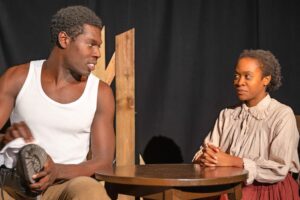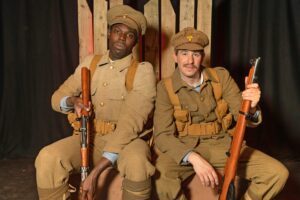Lest We Forget explores the experiences of black Britons in the period around WWI. Co-writer Rasheka Christie-Carter writes about the importance of telling stories about black British history from before Windrush ahead of a reading of the play she wrote with Charlotte Green, which takes place on Tuesday 18 August as part of Army@TheVirtualFringe.
There is a prevalent misconception that Black British history starts in 1948 when Caribbean immigrants came to Britain to help rebuild the country after World War Two.

As a writer, I have always had an interest in telling stories that explore the black British diaspora, particularly before Windrush. Deepening my knowledge about the history of black Britons (and British history in general) has and will always continue to enrich my life.
Knowing that in the 1760s, there were around 10,000-15,000 (1) black people in London makes me think about all the thousands of potential stories that can be told. We are missing out on knowing the histories of trailblazers such as Mary Prince (2), a woman whose autobiography detailing her experiences as a slave in the 1800s heavily impacted the anti-slavery movement in Britain. Another example is the story of John Blanke (3), a musician in the early 1500s, employed as a trumpeter for royals such as Henry VII and Henry VIII.
Even significant historical events in contemporary Black British history such as the 1963 Bristol Bus Boycotts and the Black Power groups of the 70s like the Mangrove Nine are still not apart of the public consciousness.
It is a shame that these parts of history are not widely known and as a writer, I will keep on creating work that actively addresses the problem. Lest We Forget is a play, about a black British man during World War One, that I co-wrote with Charlotte Green.

The play explores the untold story of the 1919 race riots while examining the mental toll of war. Narratives like these are vital for us all to develop our understanding of British history, while allowing for an acute moment of self-reflection to determine our growth, or lack thereof, as a society.

The oversimplification of black British history greatly contributes to the lack of depth in the perception of British history overall as how can we understand our history, if we only know a distorted version of it?

When the full history begins to be told, we can create a deeper, more vibrant understanding of our history. It also brings opportunities for creatives to have access to a wider variety of stories to build upon and develop.
- You can hear the reading for free by reserving a ticket at https://www.armyatthefringe.org.
(1) http://www.sportingequals.org.uk/news-and-blogs/black-history.html
(3) https://doi.org/10.1093/ref:odnb/107145

































